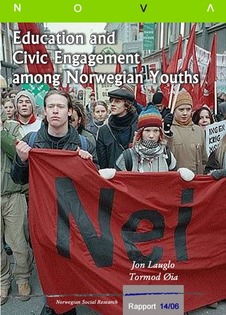| dc.contributor.author | Lauglo, John | |
| dc.date.accessioned | 2020-06-21T13:33:57Z | |
| dc.date.accessioned | 2021-04-30T07:34:45Z | |
| dc.date.available | 2020-06-21T13:33:57Z | |
| dc.date.available | 2021-04-30T07:34:45Z | |
| dc.date.issued | 2006 | |
| dc.identifier.isbn | 82-7894-243-9 | |
| dc.identifier.issn | 0808-5013 | |
| dc.identifier.uri | https://hdl.handle.net/20.500.12199/4918 | |
| dc.description.abstract | This report discusses the connection between education and civic engagement among Norwegian youth: What role does education play in building civic engagement among youths under conditions where the great majority of them are still enrolled in school when they reach the voting age (age 18 in Norway) and when close to half of the age group continues to higher education? Øia and Lauglo have analyzed a nationwide survey of more than 1100 youths in Norway that was carried out in 2002. The data shows that secondary school students that do well in school and, especially, plan to continue to higher education, are more engaged in politics than other students. Civic engagement, however, is not part of some pliant and conformist adjustment to life at school. Those who convert their interest in actual political participation have more often than others had conflictual relations with school authority. The researchers find that the positive associations between civic engagement and the measure "Political Socialization at Home" are strikingly consistens and usually quite strong, across all indications of civic engagement, and all statistical models. This measure of home influence reflects both how frequently the student talks with parents about politics and social issues, and that such communication occurs in a family context where the student is encouraged to make his/her own decisions. The Norwegian findings thus show that young people's active interest and involvement in politics continue to be strongly rooted in the family contrary to much current theorizing about the decline of influence of the family as a source of young people's identities in contemporary modern societies. The report was commissioned by The Centre for Educational Research and Innovation at OECD as part of the project Social Outcomes of Learning. | en |
| dc.description.abstract | Denne rapporten drøfter sammenhengen mellom utdanning og engasjement i politikk og samfunnsspørsmål blant ungdom. Rapporten gir en brei gjennomgang av nordisk og internasjonal litteratur på området. Videre analyseres data fra Ung i Norge 2002. Andelen unge som tar høyere utdanning har økt. Generelt viser våre funn at det er en positiv sammenheng mellom utdanningsnivå og samfunnsengasjement. | no_NB |
| dc.publisher | Oslo Metropolitan University - OsloMet: NOVA | |
| dc.relation.ispartofseries | NOVA Rapport 14/06 | |
| dc.subject | NOVA | |
| dc.title | Education and Civic Engagement among Norwegian Youths | no_NB |
| dc.type | Report | |
| fagarkivet.source.pagenumber | 104 | |
